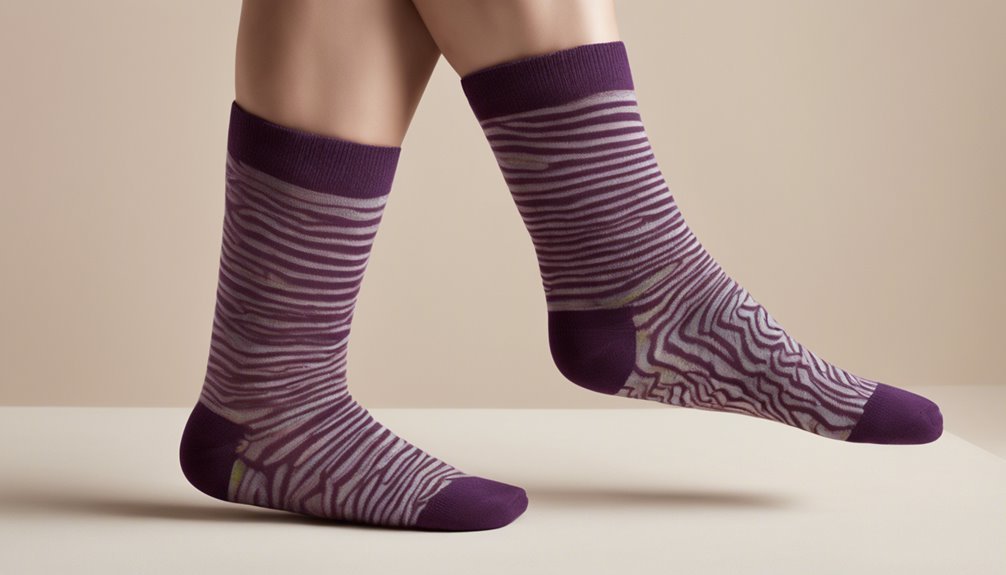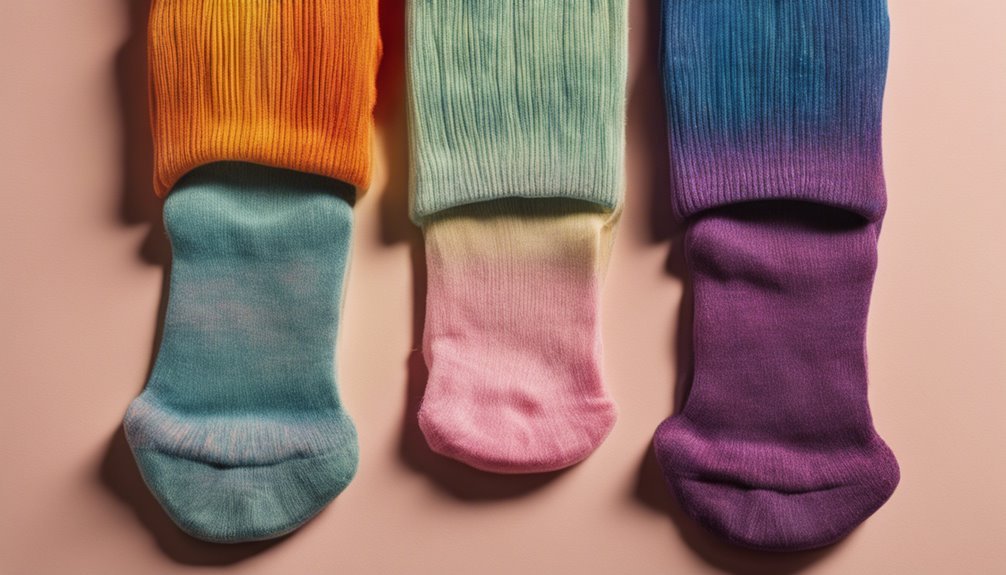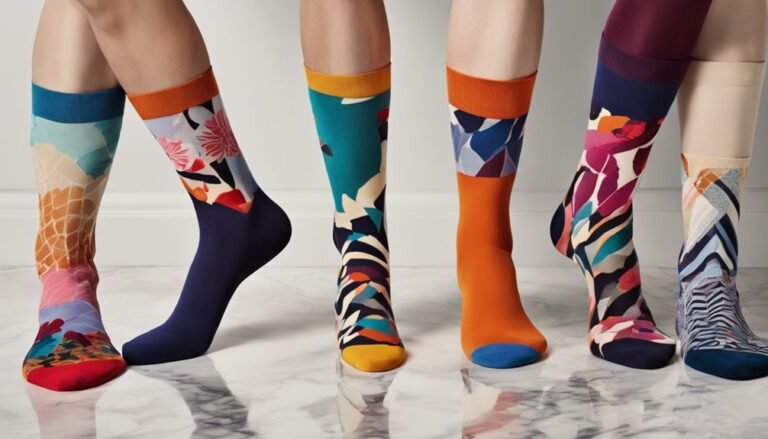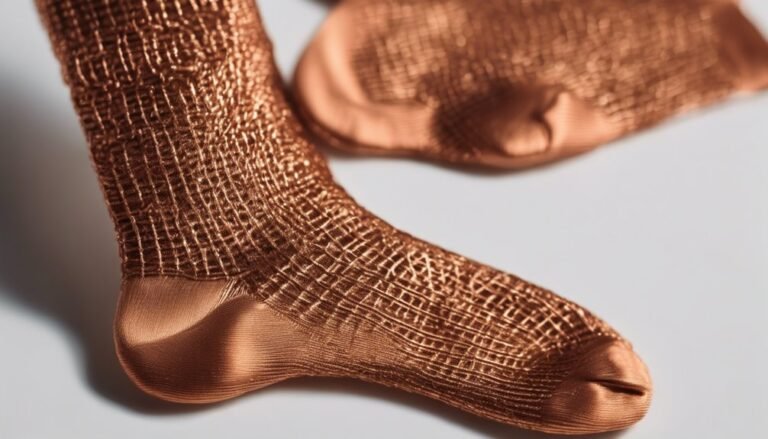Stretchy Socks vs. Snug-Fit Socks: Which Is Better for Comfort?
When choosing between stretchy socks and snug-fit socks for comfort, consider your specific needs. Stretchy socks offer flexibility and reduce irritation, while snug-fit socks provide targeted support and stability, minimizing slippage. However, stretchy socks may lose elasticity over time, whereas snug fit can feel restrictive. The ideal choice depends on your lifestyle and activity levels. Understanding these factors can guide your decision more effectively, revealing additional insights about sock options that enhance comfort.
Understanding Stretchy Socks

Stretchy socks have become a staple in many wardrobes, offering a blend of comfort and versatility. Their unique design often incorporates stretchy materials like spandex or elastane, which enhance sock elasticity. This elasticity allows the socks to conform to your foot's shape, providing a snug yet comfortable fit that doesn't restrict movement. Unlike traditional cotton socks, stretchy socks adapt to various foot sizes, making them ideal for anyone seeking freedom in their footwear. When evaluating stretchy socks, consider the balance between support and flexibility; too much stretch may lead to slippage, while too little can cause discomfort. Ultimately, understanding the properties of stretchy materials helps you choose the right socks that align with your lifestyle and comfort preferences.
Benefits of Stretchy Socks
While you might think all socks are created equal, the advantages of stretchy socks can greatly enhance your daily comfort and performance. Made from elastic material, these socks adapt to your feet's shape, providing a custom fit that minimizes discomfort. Their moisture-wicking properties keep your feet dry, allowing you to move freely without the distraction of sweat.
- Experience unrestricted movement and flexibility.
- Enjoy reduced risk of blisters and irritation.
- Feel fresh and comfortable throughout the day.
With stretchy socks, you can embrace the freedom of active living while ensuring your feet are well-supported. They not only cater to your comfort but also contribute to overall foot health, making them a worthwhile addition to your wardrobe.
Drawbacks of Stretchy Socks
Though stretchy socks offer numerous benefits, they also come with some drawbacks that should be considered. One significant issue is that the stretchy material can lead to decreased sock elasticity over time. As these socks are worn, they may lose their ability to maintain a snug fit, which can result in slipping and bunching. This can be particularly uncomfortable during physical activities. Additionally, the compressive nature of stretchy socks might not suit everyone; some individuals may experience discomfort or a feeling of constriction. Finally, the moisture-wicking properties of certain stretchy materials may be less effective than those found in snug-fit alternatives, leading to potential issues with dampness or odor. Ultimately, it's important to weigh these drawbacks against the benefits.
Understanding Snug-Fit Socks

Snug-fit socks are designed to provide a secure and supportive fit, addressing some of the common issues associated with stretchy socks. These socks utilize snug fit materials that enhance comfort and stability without compromising flexibility. Unlike their stretchy counterparts, snug-fit socks focus on ideal sock elasticity, ensuring they hug your feet just right.
- Feel the freedom of movement without the slippage.
- Experience the confidence of a sock that stays in place.
- Enjoy the sensation of a perfect fit tailored to your needs.
Benefits of Snug-Fit Socks
When you choose snug-fit socks, you're opting for enhanced arch support that can greatly improve your comfort during physical activities. These socks also reduce the risk of blisters by minimizing friction, which is particularly beneficial for long wear. Additionally, their design promotes improved blood circulation, contributing to overall foot health and performance.
Enhanced Arch Support
While many people appreciate the comfort of stretchy socks, snug-fit socks offer significant advantages, particularly regarding enhanced arch support. With advanced arch support technology, these socks provide a tailored fit that cradles your foot's natural contours. This customizable fit guarantees that the arch area receives the stability it needs, promoting better posture and reducing fatigue.
Consider the emotional benefits of snug-fit socks:
- You'll feel more energized during long hours on your feet.
- Your feet will thank you for the extra support, preventing discomfort.
- You can enjoy your activities without the nagging worry of foot pain.
Reduced Blister Risk
Choosing snug-fit socks can greatly reduce the risk of blisters, as they conform closely to your foot's shape and minimize friction. When your socks fit well, they reduce the movement between your foot and the sock, which is a key factor in blister formation. To enhance blister prevention, consider these sock material choices that provide ideal comfort and breathability:
| Material | Benefits | Considerations |
|---|---|---|
| Merino Wool | Moisture-wicking, soft | May be more expensive |
| Synthetic Blends | Durable, stretchy | Can retain heat |
| Cotton | Soft, breathable | Absorbs moisture, may cause blisters |
| Bamboo | Antibacterial, eco-friendly | Less durable than synthetic |
Implementing these blister prevention tips alongside snug-fit socks can keep your feet comfortable and blister-free.
Improved Blood Circulation
Snug-fit socks not only enhance comfort but also promote improved blood circulation, which is essential for overall foot health. When you wear snug-fit socks, you'll experience several circulation benefits that can transform your daily activities:
- Enhanced blood flow keeps your feet energized throughout the day.
- Reduced swelling helps maintain your mobility, allowing you to move freely.
- Lower risk of fatigue means you can enjoy activities longer without discomfort.
Drawbacks of Snug-Fit Socks
Although snug-fit socks can provide a sense of security and support, they come with several drawbacks that can affect comfort and foot health. First, compression issues arise if the socks are too tight, potentially restricting blood flow. Additionally, sizing concerns can lead to discomfort; if you choose the wrong size, you might experience pinching or irritation. Below is a summary of these drawbacks:
| Drawback | Effect on Comfort | Notes |
|---|---|---|
| Compression Issues | Reduced blood flow | Risk of numbness |
| Sizing Concerns | Pinching and irritation | Make sure to measure feet |
| Material Limitations | Reduced breathability | Can lead to sweaty feet |
| Temperature Sensitivity | Extreme warmth or coolness | Comfort can fluctuate |
| Durability Issues | Quick wear and tear | May require frequent replacement |
Comparing Comfort Levels

When it comes to comfort levels, stretchy socks often provide a more forgiving fit, allowing for greater flexibility and ease of movement. Conversely, snug-fit socks may offer a secure feeling that many find reassuring, especially during physical activity. Understanding these contrasting benefits can help you determine which type aligns best with your comfort preferences.
Stretchy Sock Advantages
While personal preference plays a significant role in sock comfort, stretchy socks often provide distinct advantages that enhance the overall wearing experience. Their stretchy material allows for comfort flexibility, adapting to your unique foot shape and movements. This adaptability can lead to a more enjoyable day, whether you're lounging at home or on the go.
- Feel the freedom of unrestricted movement.
- Enjoy a snug fit that doesn't constrict.
- Experience all-day comfort without adjusting your socks.
These features not only contribute to physical comfort but also foster a sense of ease, allowing you to focus on your activities without the distraction of uncomfortable socks. Choosing stretchy socks might just be the key to revealing your ultimate comfort potential.
Snug-Fit Benefits
Snug-fit socks offer a unique comfort experience that many wearers appreciate, particularly for their ability to provide targeted support and stability. These socks often utilize compression technology, which enhances blood circulation and reduces fatigue during extended wear. This targeted compression can be especially beneficial for active individuals or those on their feet all day, as it helps prevent soreness.
Additionally, snug-fit socks are designed with moisture management features, ensuring that sweat is efficientlywicked away from your skin. This keeps your feet dry and comfortable, minimizing the risk of blisters and odor. When you prioritize comfort and performance, snug-fit socks clearly stand out, offering a tailored fit that adapts to your foot's contours while maintaining breathability for all-day wear.
Factors to Consider When Choosing
Choosing the right sock can greatly impact your comfort and performance throughout the day. To make an informed decision, consider the following factors:
- Material Types: Different fabrics like cotton, wool, and synthetic blends offer varying levels of breathability and moisture-wicking properties.
- Sock Thickness: Thicker socks provide extra cushioning, while thinner ones can enhance breathability, affecting your overall comfort.
- Fit and Flexibility: Stretchy socks may allow for more freedom of movement, while snug-fit options offer support and stability.
Understanding these elements helps you select a sock that meets your specific needs. Whether you prioritize warmth, support, or flexibility, knowing the material types and sock thickness can ultimately enhance your daily comfort and performance.
Personal Preferences and Lifestyle
When it comes to selecting socks, personal preferences and lifestyle play an essential role in determining what works best for you. Your comfort preferences might lean toward the gentle embrace of stretchy socks, perfect for all-day wear, especially if you're on your feet frequently. Alternatively, snug-fit socks may cater to your active lifestyle choices, providing the support needed for sports or other high-intensity activities. Consider how your daily routine influences your sock selection; if you prioritize flexibility and ease, stretchy options may win out. However, if you value stability and a secure fit, snug-fit socks could be your go-to. Ultimately, understanding your unique lifestyle and comfort preferences will guide you toward the right sock choice for every occasion.
Frequently Asked Questions
Can Stretchy Socks Lose Their Elasticity Over Time?
Yes, stretchy socks can lose their elasticity over time. The elasticity lifespan depends on the sock material; lower-quality fabrics tend to degrade faster, leading to a less supportive fit. Proper care can extend their lifespan.
Are Snug-Fit Socks Suitable for All Foot Shapes?
Imagine slipping into a sock that hugs your foot perfectly. While snug-fit socks can offer great support, their suitability varies with foot shape variations and comfort preferences, so it's wise to try before you buy.
How Do I Properly Wash and Care for These Socks?
To properly care for your socks, wash them in cold water to prevent shrinking, and use a gentle cycle. For sock drying, air-dry them instead of using a dryer to maintain their shape and elasticity.
Do Stretchy Socks Provide Any Arch Support?
Think of your feet as a canvas; stretchy socks often lack robust arch support options, potentially impacting comfort levels. If you need support, consider alternatives designed specifically for arch stability to keep your feet happy.
Can I Wear Snug-Fit Socks With Athletic Shoes?
Yes, you can wear snug-fit socks with athletic shoes. Their snug fit benefits offer stability and enhanced athletic performance, ensuring your feet stay secure, reducing movement, and improving overall comfort during intense physical activity.







